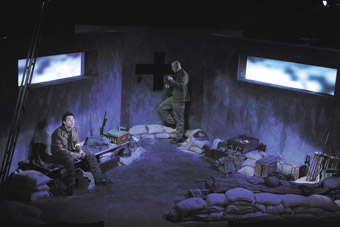war at a distance
jonathan bollen sees the premiere of caleb lewis’ dogfall

Joseph Del Re, Brendan Rock, Dogfall
photo Nic Mollison
Joseph Del Re, Brendan Rock, Dogfall
THE ‘THEATRE OF WAR’ IS A CURIOUS PHRASE WITH AN IRONIC RING. IT CONJURES AN IMAGE OF GENERALS, COMFORTABLY AT WAR, GATHERED AROUND A MAP ON A TABLE IN THE OFFICERS’ TENT, ARRAYING THEIR FORCES, THEIR PAWNS, IN WHAT SEEMS AN IMAGINARY GAME, A REPRESENTATIONAL FRAME, DIVORCED FROM THE ACTUALITY OF THOSE FIGHTING THE WAR.
That great 19th century theatrical shift—from actor-manager on the stage to theatre director in the auditorium—had an antecedent in military practice. By the time Carl von Clauswitz coined the phrase in his book On War (1832), the generals had long ceased leading armies into battle. Like the leading men of the theatre, they had retreated from the main action on stage. Modern war, like modern theatre, was to be directed from a distance.
These days wars fill our screens with their spectacle. Their ‘shock and awe’ imitates the animated splatter of computer games while, in the intimacy of our theatre, playwrights, actors and directors conduct laboratory experiments in the trauma psychology of men at war. Caleb Lewis’s Dogfall is a well-pedigreed play, declared ‘wonderful’ by American playwright Edward Albee, with whom the Australian Lewis undertook a two-week workshop on another of his plays. The wonder, I think, is Lewis’s imaginative insight into war and what can make us care.
The scenario is a war-time convention. Will (Brendan Rock) and Jack (Joseph Del Re) are soldiers, mates in the adversity of war. Life in the trenches means living it rough and doing it tough, while the battle rages and rumbles like thunder off-stage. They are disturbed by a third. A boy soldier, Alousha (Martin Hissey), becomes the unwitting target for their rough love, their piss-anguished fear, their gut-empty catharsis.
Director Justin McGuinness commands the energies of emotional realism from the actors. They sweat with fear and eat tinned food for real. They smoke on stage and drink and swear like troopers. They piss and shit copiously off stage to dysenteric sound effect. With the synaesthesia of intimate theatre, the production’s signifiers mingle in my nostrils: whatever the conflict, war stinks.
Lewis arrays the wars of past and present like tin cans in a rough-shot shooting gallery. While the characters conform to the continuities of drama, the theatre of their war changes with each scene—the Somme, Edessa, Guernica, Nanking, Northern Ireland, London, Treblinka, Stalingrad, Japan, Korea, Vietnam, Phnom Penh, Israel, Mogadishu, Kuwait, Home (as comic interlude), Bosnia, Rwanda, New York, Guantanamo Bay—till we end up bogged down in mud, mired in oil and blood with the dying and the dead.
Yet sitting in the audience, it’s for neither Will, Jack nor Alousha that I care. Their suffering is tarnished by the complicity of their guilt. In this theatre of war, there are no conscientious objectors, no women and children to be spared. I am desensitised to all but dogs, that fall mysteriously from the sky on the screens behind. I see an Alsatian falling, a Saint Bernard, a Dalmation. A spotty mongrel falls. I yelp in pain. “It’s just meat”, says Will. But not to me. I care.
TheimaGen, Dogfall, writer Caleb Lewis, director Justin McGuinness, performers Brendan Rock, Joseph Del Re, Martin Hissey, design TheimaGen, Tsubi Du, sound Peter Nielsen, lighting Nic Mollison; Bakehouse Theatre, Adelaide, Nov 2-17
RealTime issue #82 Dec-Jan 2007 pg. 33






